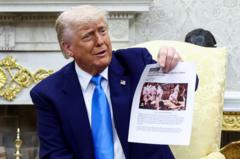In a high-drama encounter that unravelled in the Oval Office, President Donald Trump confronted South African President Cyril Ramaphosa with provocative claims about the alleged persecution of white farmers during their meeting. The exchange, which included a hastily prepared video presentation designed to underline Trump's assertions, showcased a unique clash of diplomatic styles. Ramaphosa's strategic calm and thoughtful responses allowed him to uphold his position, despite the pressure applied through televised provocations.
**Ramaphosa Stays Composed Amid Trump's Provocative Display During White House Meeting**

**Ramaphosa Stays Composed Amid Trump's Provocative Display During White House Meeting**
In an unusually tense meeting, South African President Cyril Ramaphosa navigated Donald Trump’s public accusations regarding white South African farmers with grace and composure.
In what has become a hallmark of Trump's foreign interactions, the meeting began with light discussions before transitioning sharply to controversial topics. When a journalist inquired about the president's stance on discredited claims of "white genocide" in South Africa, Ramaphosa seized the moment to insist on the importance of listening to South African voices on the matter.
As tensions mounted, Trump theatrically called for the room's lights to be dimmed and presented footage highlighting inflammatory rhetoric against white South Africans. The video included political figures portraying anti-apartheid sentiments, prompting Trump to claim that these political actors possessed the power to seize land. Ramaphosa, however, made efforts to dispel these misconceptions, highlighting that the controversial land reform bill he signed had yet to be enacted.
Ramaphosa arrived prepared for a contentious discussion, employing an unconventional approach by bringing renowned golfers Ernie Els and Retief Goosen into the diplomatic fray. Trump's evident fondness for the golfing celebrities inadvertently distracted from the confrontational aspects of the meeting. Ramaphosa adeptly utilized this distraction to maintain a composed demeanor throughout.
Despite Trump's numerous attempts to provoke a reaction regarding the plight of white farmers, Ramaphosa remained unperturbed, stating, "If there was Afrikaner farmer genocide, I can bet you, these three gentlemen would not be here." His ability to sidestep contentious issues while subtly asserting his position proved effective.
The encounter underscores the divergent diplomatic styles employed by Trump and Ramaphosa. While Trump's approach appears tailored to energize his domestic base by harnessing perceived grievances, Ramaphosa’s composed navigation of these provocations illustrates a more traditional, controlled form of diplomacy.
As such interactions grow more complex, both leaders may need to reassess their strategies; Trump’s assertive tactics might spark a necessary evolution in how he engages with foreign counterparts moving forward. The implications of these meetings resonate beyond immediate discussions, reflecting broader political narratives within their respective countries.
As tensions mounted, Trump theatrically called for the room's lights to be dimmed and presented footage highlighting inflammatory rhetoric against white South Africans. The video included political figures portraying anti-apartheid sentiments, prompting Trump to claim that these political actors possessed the power to seize land. Ramaphosa, however, made efforts to dispel these misconceptions, highlighting that the controversial land reform bill he signed had yet to be enacted.
Ramaphosa arrived prepared for a contentious discussion, employing an unconventional approach by bringing renowned golfers Ernie Els and Retief Goosen into the diplomatic fray. Trump's evident fondness for the golfing celebrities inadvertently distracted from the confrontational aspects of the meeting. Ramaphosa adeptly utilized this distraction to maintain a composed demeanor throughout.
Despite Trump's numerous attempts to provoke a reaction regarding the plight of white farmers, Ramaphosa remained unperturbed, stating, "If there was Afrikaner farmer genocide, I can bet you, these three gentlemen would not be here." His ability to sidestep contentious issues while subtly asserting his position proved effective.
The encounter underscores the divergent diplomatic styles employed by Trump and Ramaphosa. While Trump's approach appears tailored to energize his domestic base by harnessing perceived grievances, Ramaphosa’s composed navigation of these provocations illustrates a more traditional, controlled form of diplomacy.
As such interactions grow more complex, both leaders may need to reassess their strategies; Trump’s assertive tactics might spark a necessary evolution in how he engages with foreign counterparts moving forward. The implications of these meetings resonate beyond immediate discussions, reflecting broader political narratives within their respective countries.





















